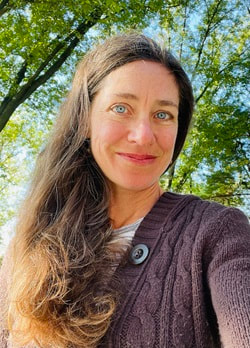AUTHOR PROFILE
Michelle Meyer is the author The Trouble with Being a Childless Only Child (Cornerstone Press, February 2024) and The Book of She (2021), a poetry and visual art collaboration devoted to women. Recent work appears Under Her Eye: A Blackspot Books Anthology, Nebulous, Remington Review, Spank the Carp, Tiny Spoon, and Welter, among others. In addition, Michelle has written, directed, and produced numerous one-act plays and skits for children and adults. When not traveling as a house and pet sitter, she writes and lives in Western Wisconsin. Find her at www.michellemeyerwrites.com and @meeshmeyerwrites.
|
Michelle's work appeared in Pond 77
|
Why do you write?
I write because I can’t not write. Plenty of rejection letters hit my inbox and while it always stings to see “Dear Michelle Meyer, Thank you, but unfortunately…”, I keep going because the process of writing just makes me feel good. It serves as both a meditative practice and a way to organize my often incongruent, disordered thoughts. I love to lose myself in the deep focus and challenge of piecing together word puzzles of my own making. I think creativity begins with curiosity and I am endlessly (annoyingly) curious. Writing is one of the ways I lean into and explore that curiosity.
What other creative activities are you involved in?
Since childhood I have been a devoted visual artist so when I entered college, I was excited to earn a degree in graphic design. It’s an art form that I love and continue to practice but ultimately decided not to pursue professionally. As it turned out, I was a total corporate misfit. At my core I’m a passionate thespian. Unlike many writers I am an extrovert and love to be on stage! Put me in a monkey costume or Victorian bustle and I will play—or even write—the part. There can’t be a play without a script and I’ve had great fun penning, producing, and directing a few.
Who is your favorite author and why?
I’ve read nearly everything written by Elizabeth Strout, Ann Patchett, Elizabeth Gilbert (her fiction is practically edible), and Louise Penny. Memoir: Abigail Thomas and Maggie Smith yank me right into their worlds with strong, compassionate voices and structure that lives outside the status quo. Poetry: e.e. cummings was the first poet that really cracked my head open because his use of language was so experimental at a time when that wasn’t popular. Reading his work still feels electric. Other beloved poets in no particular order: Mary Oliver, Joyce Sutphen, Tony Hoagland, Ada Limón, Billy Collins, Laura Mullen, Gregory Orr, Saeed Jones, Victoria Chang, Marie Howe, Sharon Olds, Ocean Vuong, Lucille Clifton, every poet I read on The Slowdown, every poet whose work is read and contemplated by Pádraig Ó Tuama on Poetry Unbound, every poet interviewed by the brilliant Helena de Groot on Poetry Off the Shelf.
Tell us about the mechanics of how you write.
I always begin with pen and paper. If I’m struggling with a piece, I either move on to something else or leave it altogether and take a long walk. Many of my poems begin or resolve while my body is active. Sometimes, when I return home, I’ll beeline to my journal and sometimes the poem will need to simmer for a few days. Whatever the situation, my method is to scribble, cross out, write in the margins, add arrows, circle words, and generally rip my poems apart before transcribing them into a word document and saving them into folders that are labeled by year. The labeling serves as both a rudimentary way to keep track of what I’ve written and a virtual time capsule—little peepholes into whatever topics and themes were most present in my thoughts during a select 365 days. If I ever become famous, I plan to virtually burn them.
Finally, what do you think about Carp, the fish, not our website?
My feelings are always best expressed with a poem.
Ode to Carp
When I catch me a carp, I’m thoroughly tickled
to chop it up and eat it pickled. I stuff it in a jar
and cover it with brine—let it sit for a long, long time,
then share it with friends for some holiday cheer,
always accompanied by a lot of beer. You can bet
there are leftovers, so I save them for fall
when we all get together for Sunday night football.
Ode to Carp
When I catch me a carp, I’m thoroughly tickled
to chop it up and eat it pickled. I stuff it in a jar
and cover it with brine—let it sit for a long, long time,
then share it with friends for some holiday cheer,
always accompanied by a lot of beer. You can bet
there are leftovers, so I save them for fall
when we all get together for Sunday night football.

